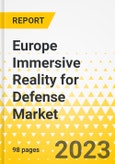Introduction to Europe Immersive Reality for Defense Market
The Europe immersive reality for defense market is estimated to reach $4.13 billion by 2033 from $0.63 billion in 2022, at a growth rate of 18.72% during the forecast period 2023-2033. The field of immersive reality for defense applications is rapidly evolving as a critical domain within the defense and military industries, driven by the growing need for innovative technical solutions to improve training, simulation, and operational effectiveness. Immersive reality refers to a set of technologies that surround users/trainees in virtual settings, delivering a multimodal experience that can reproduce real-world scenarios with remarkable fidelity and immersion.The field of immersive reality for defense applications is a driving force behind the change of military technologies, providing a diverse range of technologies and applications that challenge old defensive paradigms. As military agencies and armed forces continue to face increasing threats and operational obstacles, the incorporation of immersive reality is poised to push the boundaries of what is possible.
Market Introduction
Immersive reality technologies are rapidly transforming the landscape of defense applications, providing numerous advantages such as improved training, simulation, and operational efficiency. These cutting-edge systems are indispensable in modern defense operations due to their cost-effectiveness, realism, and varied functions. Advanced training and simulation are two of the most common applications of immersive reality in the defense sector. Soldiers can engage in realistic combat scenarios, perfect their abilities, and build tactical expertise in a safe and controlled environment using virtual reality (VR) and augmented reality (AR) devices. This not only cuts training expenses but also improves military personnel performance.Aside from training, immersive reality is useful in mission planning and execution. HUDs and augmented reality systems are utilized to give real-time information to soldiers, pilots, and commanders, improving situational awareness and decision-making on the battlefield. Furthermore, immersive reality plays a pivotal role in remote operations and drone piloting. Operators can immerse themselves in the battlefield through VR headsets, controlling unmanned vehicles and drones with precision and accuracy.
Market Segmentation:
Segmentation 1: by Application
- 3D Modeling
- Simulation and Training
- Maintenance and Monitoring
- Situational Awareness
Segmentation 2: by Country
- France
- Germany
- Russia
- U.K.
- Rest-of-Europe
Segmentation 3: by Type
- Augmented Reality (AR)
- Virtual Reality (VR)
- Mixed Reality (MR)
How can this report add value to an organization?
Product/Innovation Strategy: The product segment helps the reader to understand the different types of immersive solutions available for defense deployment and their potential in Europe region.Growth/Marketing Strategy: The Europe immersive reality for defense market has seen some major development by key players operating in the market, such as partnership, collaboration, and joint venture. The favored strategy for the collaboration between defense agencies and private players is primordially contracting the development and delivery of advanced materials and specialized composite components for space system applications.
Competitive Strategy: Key players in the Europe immersive reality for defense market have been analyzed and profiled in the study, inclusive of major segmentations and service offerings companies provide in the technology segments, respectively. Moreover, a detailed competitive benchmarking of the players operating in the immersive reality for defense market has been done to help the reader understand how players stack against each other, presenting a clear market landscape. Additionally, comprehensive competitive strategies such as partnerships, agreements, and collaborations will aid the reader in understanding the revenue pockets in the market.
Methodology: The research methodology design adopted for this specific study includes a mix of data collected from primary and secondary data sources. Both primary resources (key players, market leaders, and in-house experts) and secondary research (a host of paid and unpaid databases), along with analytical tools, are employed to build the predictive and forecast models.
Key Market Players and Competition Synopsis
The companies that are profiled have been selected based on thorough secondary research, which includes analyzing company coverage, product portfolio, market penetration, and insights that are gathered from primary experts.Key Companies Profiled:
- Bohemia Interactive Simulations
- Indra Sistemas, S.A.
- Thales Group
- Varjo
This product will be delivered within 3-5 business days.
Table of Contents
Companies Mentioned
- Bohemia Interactive Simulations
- Indra Sistemas, S.A.
- Thales Group
- Varjo
Table Information
| Report Attribute | Details |
|---|---|
| No. of Pages | 98 |
| Published | December 2023 |
| Forecast Period | 2023 - 2033 |
| Estimated Market Value ( USD | $ 0.74 Billion |
| Forecasted Market Value ( USD | $ 4.13 Billion |
| Compound Annual Growth Rate | 18.7% |
| Regions Covered | Europe |
| No. of Companies Mentioned | 4 |









